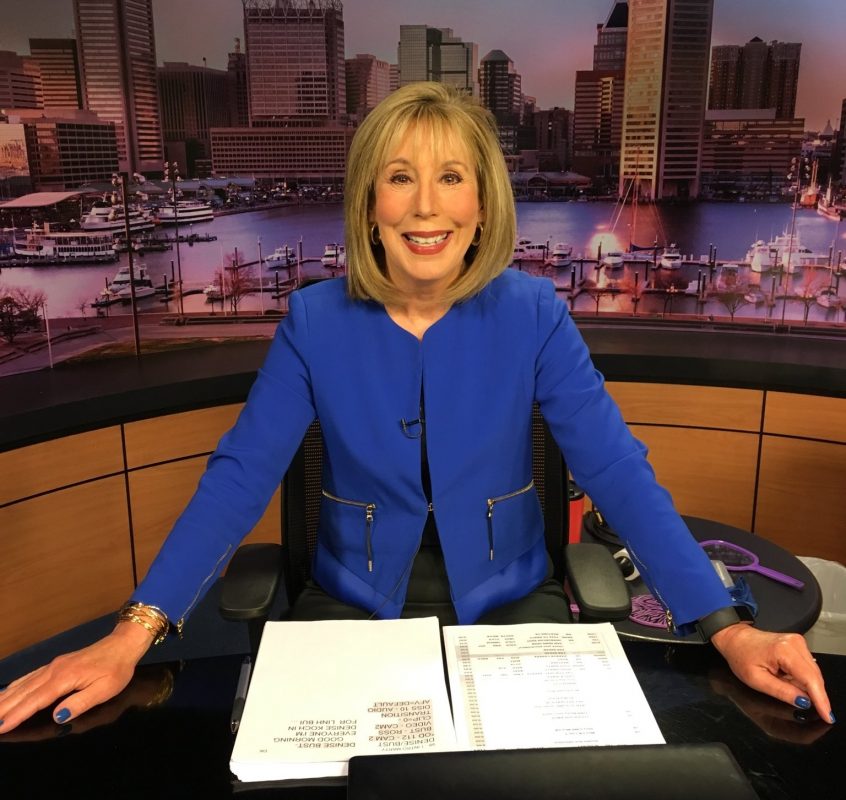
As someone who’s been anchoring television in one city for more than three decades, I’d begun to feel like I’d lived through all the challenges the news business in Baltimore could provide: the death of two beloved anchormen, the rather public gestation and birth of my twin daughters, the long fight to win a football team, the Joseph Palzynski (remember him?) hostage stand-off, the D.C. snipers, 9/11, and, most recently, Freddie Gray.
But nobody could’ve anticipated the Coronavirus pandemic. Or, at least, nobody I knew.
The thing I love about newsrooms is when something big happens, we almost instantaneously become like a small army. Everyone gets a supernatural burst of adrenaline. That’s what happened two weeks ago when General Manager Audra Swain described to the staff what CBS believed was coming and how we would adapt.
Photographers and reporters would no longer come into the building, but report remotely. Everyone who could work at home would. The on-air staff behind and in front of the camera would be pared down, dramatically. And we would rotate so if someone did become ill and quarantines were needed, we’d have a back-up. Clear? You bet. Ready, boss.
On Monday, March 16th, I head to work. Less traffic? Expected. The station gate closed in the afternoon? Unexpected. The quiet inside the newsroom: startling. Newsrooms aren’t quiet places, they’re noisy, chattering, screeching playgrounds for words and ideas. On Monday, ours was eerily quiet.
There were less than a dozen people in sight and no light banter to be heard. I go to the green room to slather my face and “wrastle” my hair and meteorologist Meg McNamara and I realize it’s too small to accommodate both of us while observing “social distancing.” Someone has to find another slathering station.
The producers format the newscasts so neither I nor co-anchor Rick Ritter will ever come closer than six feet. We learn what we begin to call the “dance.” You go to camera one, I go to camera three, camera two will never face us both . . . too close.
When walking past the floor manager, make a wide circle. When walking between the prompter and the weather desk…go sideways or you’ll violate social distancing. Every time you think of it, use wipes on your wireless mic, the keyboard and mouse, and anchor desk. When you get the chance, run to the nearest sink and wash your hands.
And, get used to total immersion in coronavirus information: 4, 5, 6, 7 and 11 p.m. you will be thinking, speaking, reading, communicating, and absorbing pandemic. And you’ll do it on your feet, and it will eventually take an emotional toll and have you looking for any excuse for levity. Because, that’s a lot of hours of pandemic.
By Tuesday, I was making up pandemic songs in the commercial breaks and the few of us working in the studio began taking playful, sarcastic verbal jabs at each other. Then we’d laugh, maybe a little too hard. We’d tell stories. We’d take every opportunity to move around the studio until, at times, Rick and I even broke out into dancing. Six feet apart, of course. But, once the camera light came on, we’d immediately shift our focus back to a national emergency that’s affecting you, me, everyone we love and all the families on whom we’re reporting.
Each evening around 10 p.m., Rick and I would Facetime live the WJZ audience, which gave us the opportunity to say all the things we weren’t formatted to say on air: We will get through this, it will end, there are things you can do to feel better such as keeping a routine, setting small goals, and heading outside.
Which brings me to, well, me. Fresh air has saved my sanity. Because by Friday I was going just a teeny, tiny bit insane. I was obsessively swallowing to see if my throat was sore, feeling my forehead, checking for every sign I was infected. Then, I’d walk outside.
The sky is still there, the air still fills my lungs, I notice signs of spring, the world has not come to an end. In fact, the people walking and jogging past me were actually smiling, and appeared even friendlier than usual.
“Go to work Denise, do your job,” I exhorted myself. And I did. And I was grateful. I was grateful to feel like I could serve in some small way, and I was grateful for the company of those wonderful people I was dancing around.
When Friday night midnight finally came and it was time for another anchor rotation, I had only one moment of deep angst. And it had nothing to do with the coronavirus pandemic. It was because I really, really wanted to hug everyone who’d lived through that week with me. I wanted to hold them and tell them how much I appreciated their hard work, their good spirit and fortitude. Of course, I couldn’t do it.
But, I will get another chance. Maybe not next week or the next several weeks but when all this ends, and it will end. Because, I have a new appreciation for my co-workers, my job, my station and my community. And when there is no more social distancing, I plan to do a lot of hugging. …and I mean a lot of body to body, close contact, lingering, squeezing hugging. Certainly to those I work with. Maybe with everyone I meet.
Consider yourself warned!
